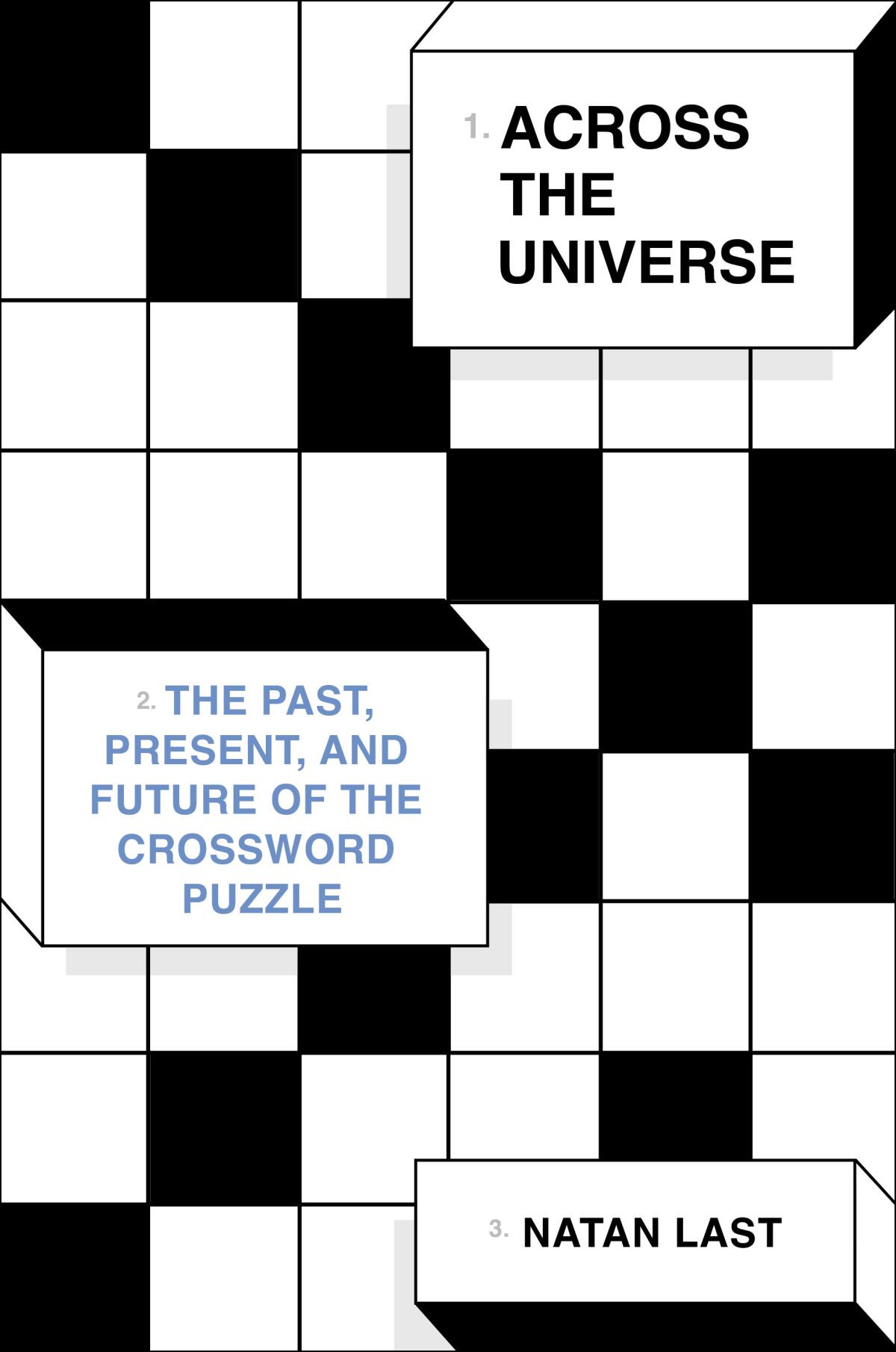Natan Last’s “Across the Universe” puzzles together crossword history
Book Review
Across the Universe: The Past, Present, and Future of the Crossword Puzzle
By Natan Last
Pantheon: 336 pages, $29
If you buy books linked on our site, The Times may earn a commission from Bookshop.org, whose fees support independent bookstores.
In August, New York City mayoral candidate Zohran Mamdani hosted a citywide scavenger hunt, inviting voters to scour the boroughs in search of historic political sites. (Grand prize: a bag of chips.) Clues for it were written by veteran puzzle maker Natan Last, who has long endorsed the idea that puzzles at their best blend politics, community and a nerdy good time.
If you missed the hunt, Last’s book, “Across the Universe,” delivers similar pleasures. Though its subtitle — “The Past, Present, and Future of the Crossword Puzzle” — suggests a history tome, Last approaches the subject essayistically. Crosswords, for him, are arguments on behalf of things: of what qualifies as “common knowledge,” of what role puzzles should play in informing a citizenry, of how wordplay and slang snake into the mainstream. “The crossword is a uniquely capacious artifact ready to absorb and recast any group’s predilections and passions into puzzle form,” he writes.
That may seem like making too much out of an everyday diversion. But as Last points out, crosswords have long been a miniature version of America’s larger culture wars. Crosswords’ popularity exploded in the 1920s in various newspapers; Ernie Bushmiller, cartoonist of “Nancy” fame, exploited the “crossword craze” in a strip called “Cross Word Cal.” But killjoys swiftly arrived to dismiss it as paleolithic brain rot. The New York Times, now the best-known purveyor of crosswords, thought the puzzle beneath it, and didn’t offer one until 1941. (“The last adult in the newsroom,” Last smirks.)

The New York Times’ crossword is synonymous with its current editor, Will Shortz, who gave the puzzle a refresh in the 1990s, jettisoning academic jargon and obscurities in favor of layered puns and pop-culture references. Last recalls working as Shortz’s intern in 2009 and loving the experience. But Last is also the point of the spear among constructors who insist there’s plenty of room for improvement: tokenized ethnic terms, lack of gender parity among constructors, double standards (“erotica” is acceptable, but “gay erotica” isn’t?), a narrow view of what readers know or will accept. “The bar is on the floor,” USA Today crossword editor Erik Agard tells Last.
For the record:
10:04 a.m. Nov. 24, 2025A previous version of this article said Mangesh Ghogre came to the U.S. on an H-1B visa. He came on an EB-1A visa.
Last’s public statements on this subject, he writes, are often met with eye rolls: “Oh, so now the crossword puzzle needs to be woke?” But that high dudgeon, he notes, is “as good a proof as any that it’s not just a puzzle.” Not for the solvers he speaks to, who use their puzzle routines as calming influences or mementos of relationships. Not for constructors like India-born Mangesh Ghogre, who came to the U.S. on a specialized visa to make puzzles and who cleverly works Indian themes into his grids. And certainly not for institutions like the New York Times, which has made games a profit center in a news industry that’s often hemorrhaging cash.
Last’s range and intelligence help sell the importance of the crossword, then and now. Still, its lack of a direct throughline can be frustrating. Like a particularly manic solver, he attacks the subject in an across-and-down fashion, here contemplating the impact of AI on the game, there considering what role crossword-style wordplay had on Modernist writers like T.S. Eliot and Gertrude Stein, now contemplating the 1920s crossword craze, now skipping to its 2020s COVID-prompted renaissance. It’s all relevant, and Last is a bright and witty guide through all of it. He demands a certain comfort level with disorientation, though.
Still, that’s kind of the point: For him, puzzles should motivate solvers to be more than half-thinking box fillers. Instead, we should be comfortable learning new ideas through the puzzle. Mamdani’s scavenger hunt didn’t play a big role in his eventual election to the mayorship in October; it probably didn’t even play a small one. But it spoke to the concepts of play, surprise and diversity that the crossword at its best represents for Last. Maybe you don’t have immediate recall on the word “Haudenosaunee” (the Native name for the Iroquois Confederacy), but what’s so bad about a crossword puzzle introducing you to it? Like every other section of the paper, the crossword can bring the news. It can evoke — and shape — a culture.
